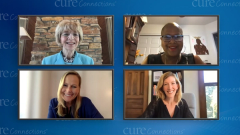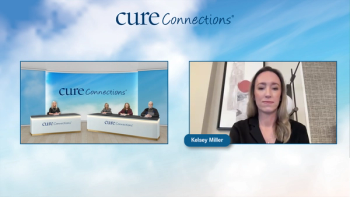
Social Impact of Metastatic Breast Cancer Diagnosis
The panel discusses the social impact of metastatic breast cancer diagnosis on the relationships in their lives.
Episodes in this series

These are the experiences and opinions of panelists, not physicians.
Shirley A. Mertz, MA, JD: I guess one of the things that I found interesting, and I'd love to hear your experience, is that when I tried to share my experience with my family and or friends, I found some of them were very empathetic, but others of them started shrinking away from me. And I even mentioned when I said metastatic breast cancer isn't contagious, but that wasn't her worry. I'll start with you, Lisa, did you find that any relationships changed because you now had metastatic disease, or were you the lucky one where people rallied around you?
Lisa Laudico: Yeah, I think I am one of the lucky ones. I had incredible work colleagues who have continued to be super supportive of me. I have really wonderful friends locally and abroad and all over the place. And I have a great family. Unfortunately, my family is so far away. My core family is all up in Toronto, so I've really been isolated from them during COVID. I particularly, missing them. My husband, it was probably my biggest concern because emotionally, I felt it would just- I didn't have faith that he could cope with it. He's really grown in the past four years and he's in a really much better place in terms of being able to handle it. But in terms of people turning away, I feel like as I grew my circle of knowledgeable people or people who knew, right? You tell your core and then you're getting more public and more public. I don't recognize the people maybe in the outer rings, who aren't tapping in or checking in or whatever. But sometimes it'll come up and I'll realize, oh, you know what? They're just not able to cope with this kind of designation or this diagnosis rather. And so, they sort of go, "Hey." on occasion, but they're not really there, right?
Shirley A. Mertz, MA, JD: Right.
Lisa Laudico: And I understand that. I actually should make a confession because I've had lots of really dear friends, unfortunately, have cancer or died with cancer. And before my diagnosis, I had a friend who had breast cancer and she's a really capable, incredible woman. And she had it all under control. It was an early-stage diagnosis. And I feel like I wasn't as great with her as I should have been in terms of sticking, following up with her, trying to be intuitive in terms of what she might need. Not asking her, "Wat can I do for you?", but being intuitive to what she might need. And I feel like I didn't have my aching and I've talked to her about it. I've said, "You know what? I just feel like I may have let you down. I wasn't as good as I could have been for you." She's doing great right now. And her cancer is in remission or gone. And we've been able to have these conversations. I don't have any animosity or ill will towards people who struggle with dealing with death and dying. I think that our society does not provide tools for people to talk about these hard things. It's our job sometimes, unfortunately, to help educate and help diminish these fears. You're not going to catch it. I know it's terrible sometimes. It's going to be OK.
Shirley A. Mertz, MA, JD: I'll go to you in a minute, Sheila, for maybe if you have a relationship story you want to share. But I find that people, when you tell them I have this disease and it's not- I've been told it's not curable. They'll say, "Oh, you have breast cancer. You know? I had an aunt with breast cancer. She went through all the treatment. She's doing just fine right now. You'll beat it." And you realize Oh, when I started being an advocate, I thought the public needs to understand the differences. So, Sheila, do you have maybe a quick account of a relationship that changed for you, or have you been a fortunate person like Lisa to in most cases, have people rally around you?
Sheila McGlown: No, I think some have dropped off, but I think most have rallied around me, especially in the advocacy world. Because when I was diagnosed, I didn't even know that- I live in Illinois, but I'm on the Illinois/Missouri border. And I didn't even know that there were breast cancer support groups. And finally, I'm blessed that my breast surgeon took an interest in me for some reason. And she sent me this flyer. And then she said, "Sheila, I want you to go to the symposiums for breast cancer. And they had living beyond breast cancer and different things." And I went out and just hope it open up a whole brand new world for me. But with my family, we don't talk about it. Because it's memories of my mom. And I've learned that over the 11 years, or even when my daughter, sometimes she goes, "Mom, I'm in Hobby Lobby or somewhere." I'm like, oh, I got to get at breast cancer. I'm going to make her a blanket. And she was like, "Mom, do you ever shut off?" And I was like, no, I'm always thinking about the people but now- Yeah. But now, I think I've gained more. And this is just about understanding the disease. And I want them to understand it because just in case. Never know what's going to happen.
Shirley A. Mertz, MA, JD: Right. And if we think about it as we go through life, even if we didn't have the disease, we do have friends that come and go in our life. But let's turn to the expert, our social worker, Julie Larson. Julie, what suggestions do you share with your clients or those who come to you who maybe need help dealing with the fact that they are dealing with an incurable disease? They don't know when they're going to die, how they're going to die. Those are really heavy issues. Could you share maybe some things for our listeners?
Julie Larson, LCSW: I've also- First just want to comment on what was just said around me by Lisa and Sheila, because I find that some of the points that they just raised are so important and maybe don't get enough attention. When you talk about that initial diagnosis, I think everyone assumes, yeah, we're going to feel shocked, we're going to see sadness, we're going to go disbelief. But people walk through the doors of my office feeling isolated, feeling really alone, and it's feeling like- And I think that that experience is even more intense for those women that are diagnosed with metastatic disease because suddenly you don't know who your people are. I am not going to tell that breast cancer patient that, oh, you've got breast cancer and you're going to be OK. No, I didn't get there. The cancer survivor community uses terms like fighter and beat this. And I didn't. And I'm not going to get there. I feel alone in that. I think that isolation and not knowing where I belong is the key. And I heard that from both of them. I also heard that sense of awareness of others. She can't talk to her family because there's this deep history there. And cancer is just a scary thing and Lisa's feeling like, oh my gosh, the first person I think about is not my self, i's my children and other people. And those are other big things that walk people into my office. It's not just my reaction, but the way in which this impacts so many people around me. I just want to say that, that we're hearing that. I think that metastatic disease is uncomfortable for other people because we so often want to take a problem, buttoned-up, strap it down, put it in a neat little bento box, right. And we cannot do that.
Shirley A. Mertz, MA, JD: I like the description.
Julie Larson, LCSW: That's uncomfortable. If you're on a high response and that when you asked me how do I deal with that, I think that that would be the first thing that I begin to talk with people is that, hey, we're going to need to begin to think about how tolerant, discomfort, right?
Shirley A. Mertz, MA, JD: Yes.
Julie Larson, LCSW: Because there's a piece of uncertainty and unsettledness and worry and fear. I'm just going to walk right beside you. And you may feel that pretty powerfully some days and other days it might linger in the background and you're able to focus in a much more proactive and meaningful way with your life. But I think that one of our goals is we're going to need to begin to really look that in the eye and learn how to feel and be present even in the midst of those feelings.
This transcript has been edited for clarity.




